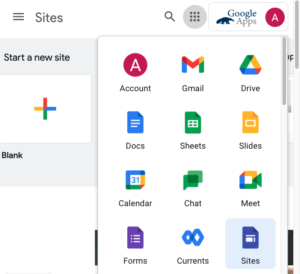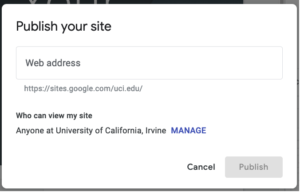To help you grasp your active role in learning from the Humanities Core lectures, the year-long Learning Encounters Website project guides you to use an online space of your own to think through the concepts and methods of analysis you encounter and, eventually, to apply them in your own research. On the personal academic website you create, you will be able to think through and about these encounters by writing out your thoughts in multimodal compositions that may include images, audio, video, or other media. In the process, you will develop flexibility in writing for particular situations, and you will practice locating reliable sources and citing them responsibly.
In the Fall quarter, as you are introduced to various approaches to the environmental humanities by lecturing faculty from different humanities disciplines, you will engage in three guided activities to compose pages on your website. You will create your site using UCI Google Sites; if you wish to use another platform, please speak to your seminar instructor before starting the assignment. The audience for your site will be your seminar classmates and instructor, so be sure to “publish” your site in order to make it visible to them, and “publish” again each time you add or edit a page. You will share the site link on the Canvas site for your seminar and also submit URLs for your assignment submissions. By the end of the quarter, your Fall Learning Encounters Website will have a home page that introduces the site and one page for each of the three activities you complete.
Your work on your Fall Learning Encounters Website will be worth a total of 20% of your lecture grade and will be assessed according to the rubric criteria. Because the webpages you create will contain more than text, the suggested length of the webpage for each activity is measured not by the number of words but by the approximate time it would take a site visitor to experience it.
Learning Goals
In successfully completing this assignment, students will:
- Engage critically with ideas learned in lecture by identifying and applying concepts and interpretive methods and drawing connections among course materials and topics
- Engage creatively with ideas presented in lecture and with course materials and topics by expanding on those ideas or drawing connections to other cultural works or contexts
- Exhibit rhetorical awareness of purpose, audience, genre, and context in choices of style, multimedia, and textual and visual organization
- Reflect critically on the experience of learning through multimodal communication
- Demonstrate information literacy skills by locating, evaluating, and integrating primary sources from institutional digital archives or scholarly digital publications
- Develop digital literacy and transferable technical skills through the design of a basic website
- Produce accurate, ethically responsible communication with citational practices appropriate to scholarly digital media
Required Reading
In addition to attending the lectures attentively, read the following for context and information before beginning this project.
Davis, Rebecca. “Environment | Encounter | Entanglement: An Introduction,” Humanities Core Handbook: Environment | Encounter | Entanglement 2025–2026. Macmillan Learning, 2025, pp. 13–29.
Herrmann, Amalia. “Critical Skills for Attending to Your Digital Entanglements” and “A Site to Reflect on Your Learning Encounters,” Humanities Core Handbook: Environment | Encounter | Entanglement 2025–2026. Macmillan Learning, 2025, pp. 46–70.
Platforms
As explained in the Humanities Core Handbook chapter “A Site to Reflect on Your Learning Encounters,” you will use your UCI Google Workspace to create a UCI Google Site, by default visible only to members of the UCI community.


For help, visit Google Sites Support or join the course help session in Week 1. Keep in mind that it can be difficult to create a Google Site on a phone. Drop-in computer labs and 48-hour laptop rentals are available to all UCI students for no cost.
No special software will be required to complete the website activities; you may use whatever desktop or mobile apps you prefer to capture, create, or edit media (photos, images, audio, or video). Your UCI Google Site will be stored in your UCI Google Drive, which provides organizable storage space for media files and documents. You can collect materials in your UCI Google Drive for easy embedding in pages of your UCI Google Site. You are strongly encouraged to save drafts of your work in a document in your preferred software (Google docs, etc.).
Activities
Your seminar instructor may adapt these activity prompts for your seminar; be sure to pay attention to the instructions on your seminar’s Canvas site.
1. Noticing Entanglements

Prof. Davis’s lectures and introduction to the Humanities Core Handbook invite you to start noticing specific times, places, or situations in your day-to-day life in which you encounter the entanglement of “nature” and “culture”: sites where it’s impossible to separate the two or moments when you might think you’re in one realm but it’s actually both. What do you see, hear, or otherwise sense as you begin to notice encounters that complicate distinctions between “nature”/“culture” or “human”/“non-human”? And how can you record and reflect thoughtfully on those moments using the space of a webpage?
For this activity, aim to capture at least one image from or representing such an encounter (take a photo or a video or make a sketch) to share on your webpage, and reflect in your own words on what you learned from the lectures that enabled you to notice a situation challenging the usual binary understanding. What language or stories from the past might have shaped how you perceive such situations, and what new ways of thinking about the environment and our relationships within it are you now gaining from this course? How do you think these new perspectives might change the way you think about yourself as a UCI student, reader, and writer?
Keep in mind that your website is a space for you to think through, in words and other media, what you are learning, experiencing, and thinking as a Humanities Core student, not reproducing generic statements that could be made by just about anyone, anywhere. You might find it appropriate to use the first-person “I” in your website writing, and you should clearly indicate the original images or video that you made.
Length: A HumCore seminar community member should be able to read/view the contents of this page in about 5 minutes.
2. Considering Classification
As Prof. Martin asserts in his Humanities Core Handbook chapter, literary genres change over time and “with the times” (HCH 140). Using the critical ways of considering genre classifications that you are learning from his lectures, what can you observe and analyze about the narrative works you’ve read, watched, or listened to from your youth till today? For this activity, present examples of one or two storytelling works of fiction, of any form or medium, that you know well, and reflect on the genre(s) under which they have been classified. What genre conventions do the works employ or subvert? What can you learn now by considering the historical context in which the works were produced (which you might not have been aware of at the time you encountered the works)? To what extent did the choice of genre make you feel part of a community, “foster[ing] a sense of belonging,” as Prof. Martin puts it (141), at a particular place and time?
Be sure you responsibly credit and provide links to the sources of any quotations, images, video clips, or audio clips you include on the page.
Length: A HumCore seminar community member should be able to experience the contents of this page in about 5 minutes.
3. Reflecting on Change
In his chapter in the Humanities Core Handbook, Prof. Pitt invites you to speculate:
Your life, whether you like it or not, is entangled in green. What would happen if you thought more about that fact? How would not only your idea about plants change, but also your ideas about human beings, and by extension, your ideas about your very self also change? (HCH 164)
How have your ideas about plants and their visual representations changed through your encounters with new concepts and methods of analysis presented in Prof. Pitt’s lectures? Using your ability to locate, embed, and responsibly cite images, select and share one to three images from the Miyazaki films and/or the multimedia website Prof. Pitt assigned you to view, and reflect on your ability to notice aspects of these examples you might not have considered on first glance. (Note: You can use your device to take screenshots of videos in UCI Google Drive. Providing a time stamp for an image from a film can help you and your site visitors locate that shot in the film.)
Ten weeks in the life of a tree might not be as eventful as ten weeks in the life of a UCI student seem to be. As you approach the end of your first quarter of Humanities Core, look back to what you shared in your first activity and consider: How has what you experienced in lectures this quarter affected how you think about the environment, encounters, or entanglements? Has your reading, listening, viewing, or experiencing become more aware or attuned in any way? Have your ideas about yourself as a student, reader, or writer changed? What have you started to notice or think about critically that you did not attend to before? And how specifically can you trace any changes back to key concepts, methods, or examples presented in the lectures?
Length: A HumCore seminar community member should be able to experience the contents of this page in about 5 minutes.
